|

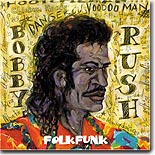 It started out innocently enough.
Bobby Rush
had always wanted to cut an album of traditional blues, an album that
would remind him of the music he heard as a youngster in Louisiana and
Arkansas. That’s what he set out to do with this recent session, along
with his regular guitarist, the underrated Steve Johnson, on bass,
former Stax session drummer Charlie Jenkins, and special guest Alvin
Youngblood Hart on guitar. However, once the instruments were plugged in
and the music started to flow, Rush ended up with an album that, while
still traditional, gives a definite nod to the future as well. Folkfunk,
Rush’s third release on his Deep Rush label, may be the disc that gives
his career that push to the more widespread recognition that he’s been
looking for. The songs are all familiar themes to most blues fans, but
Rush adds his own distinct touches to each of the 11 tracks. The
opener, “Feeling Good,“ also serves as the closer, and its incessant
rhythm will permeate into every pore as you listen. Standout tracks
include “Uncle Esau,” a tribute to a musical influence from Rush’s early
years, a reworking of the Rice Miller classic, “Ninety-Nine” (with some
great guitar from Mississippi living legend and former Rush band leader
Jesse Robinson), and an unbelievably funky redo of one of Rush’s classic
tunes, titled “Chicken Heads - Refried.” It was Hart’s guitar work on an
impromptu jam on ”Chicken Heads” initially that led to the final results
of this session, and if it was anything like the final product, I can
understand what prompted the change in direction. Other tracks worth
mentioning are the swampy “Voodoo Man,” “Ride In My Automobile,” which is
steeped in Chicago Blues, and “Saints Gotta Move,” a funky medley of the
gospel standards “When The Saints Go Marching In” and “You’ve Got To
Move.“ Throughout the disc, bassist Johnson and drummer Jenkins lay down
some of the funkiest rhythm this side of late '60s James Brown, and Hart
has never sounded better on guitar. Meanwhile, Bobby Rush is his usual
impeccable self. His vocals are right on the money and his guitar and
harmonica work (unheralded but always a pleasure to hear) are great.
Whatever your personal idea of the blues may be, this is a disc you need
to hear, traditional and reverential at its roots, but definitely with a
funky vision of what the blues may yet be. If that pitch doesn’t work,
try this one: If you’re able to listen to this disc and not move
something, whether it’s tapping your finger, your foot, or shaking your
moneymaker, you’re ready for the undertaker. It started out innocently enough.
Bobby Rush
had always wanted to cut an album of traditional blues, an album that
would remind him of the music he heard as a youngster in Louisiana and
Arkansas. That’s what he set out to do with this recent session, along
with his regular guitarist, the underrated Steve Johnson, on bass,
former Stax session drummer Charlie Jenkins, and special guest Alvin
Youngblood Hart on guitar. However, once the instruments were plugged in
and the music started to flow, Rush ended up with an album that, while
still traditional, gives a definite nod to the future as well. Folkfunk,
Rush’s third release on his Deep Rush label, may be the disc that gives
his career that push to the more widespread recognition that he’s been
looking for. The songs are all familiar themes to most blues fans, but
Rush adds his own distinct touches to each of the 11 tracks. The
opener, “Feeling Good,“ also serves as the closer, and its incessant
rhythm will permeate into every pore as you listen. Standout tracks
include “Uncle Esau,” a tribute to a musical influence from Rush’s early
years, a reworking of the Rice Miller classic, “Ninety-Nine” (with some
great guitar from Mississippi living legend and former Rush band leader
Jesse Robinson), and an unbelievably funky redo of one of Rush’s classic
tunes, titled “Chicken Heads - Refried.” It was Hart’s guitar work on an
impromptu jam on ”Chicken Heads” initially that led to the final results
of this session, and if it was anything like the final product, I can
understand what prompted the change in direction. Other tracks worth
mentioning are the swampy “Voodoo Man,” “Ride In My Automobile,” which is
steeped in Chicago Blues, and “Saints Gotta Move,” a funky medley of the
gospel standards “When The Saints Go Marching In” and “You’ve Got To
Move.“ Throughout the disc, bassist Johnson and drummer Jenkins lay down
some of the funkiest rhythm this side of late '60s James Brown, and Hart
has never sounded better on guitar. Meanwhile, Bobby Rush is his usual
impeccable self. His vocals are right on the money and his guitar and
harmonica work (unheralded but always a pleasure to hear) are great.
Whatever your personal idea of the blues may be, this is a disc you need
to hear, traditional and reverential at its roots, but definitely with a
funky vision of what the blues may yet be. If that pitch doesn’t work,
try this one: If you’re able to listen to this disc and not move
something, whether it’s tapping your finger, your foot, or shaking your
moneymaker, you’re ready for the undertaker.
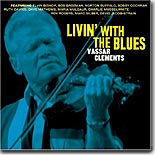 Vassar Clements has long been recognized as one of bluegrass music’s
most popular fiddlers, first coming to prominence as a member of Bill
Monroe’s band and later playing with Faron Young, Earl Scruggs and
John Hartford. Over the past 30 years, he has been in high demand as
a session player, appearing on records by Gordon Lightfoot, Jimmy Buffett, J. J. Cale and the Grateful Dead, among others, but he
probably achieved his greatest recognition for his appearance on the
groundbreaking Nitty Gritty Dirt Band‘s Will The Circle Be Unbroken
album from the early '70s. He’s also found time to record his own albums
sporadically, all of which demonstrate his uncanny ability to mix jazz,
country, and even blues into his bluegrass sound. For his latest
efforts, Clements decided to record a straight blues album.The
result, Livin’ With The Blues (Acoustic Disc) is a remarkably
entertaining effort. Clements (along with producers David Grisman and
Norton Buffalo) employs an impressive cast of supporting players, which
include Bob Brozman, Elvin Bishop, Maria Muldaur, Charlie Musselwhite,
Roy Rogers, Dave Mathews, Marc Silber, David Jacob-Strain and Bobby
Cochran, and they tackle a wide-ranging group of songs, most of which
are covers. Bishop contributes his usual wry lyrics and vocals on a
couple of tracks (“Dirty Drawers” and “That’s My Thing”), and Muldaur is
featured on Doc Watson’s “Honey Babe Blues” and the traditional “I Ain’t
Gonna Play No Second Fiddle.” Rogers teams with Clements on a remarkable
cover of Robert Johnson’s “Phonograph Blues.” Brozman’s guitar is
featured prominently on several tracks, including Tampa Red’s “Dead Cat
On The Line,” a nifty cover of “Keep Your Lamp Trimmed and Burning”
(along with Buffalo on harmonica), and the impromptu “Fiddlin’ and Faddlin’.” Perhaps the most interesting cover is the Booker T. & the M.G.s’ “Green Onions” (with Clements, Brozman, Musselwhite, bassist Ruth
Davies and Cochran on drums). Clements’ playing is incredibly diverse
over the length of the disc, ranging from mournful to exuberant, whether
he’s blending in with the others or taking a blistering solo of his own
(as on “Fiddlin’ and Faddlin’). It’s obvious he had a blast during the
session due to the relaxed interplay between him and the other
musicians. If you didn’t think the fiddle would be a good fit on a blues
record, pick up this one and prepare to be converted. Vassar Clements has long been recognized as one of bluegrass music’s
most popular fiddlers, first coming to prominence as a member of Bill
Monroe’s band and later playing with Faron Young, Earl Scruggs and
John Hartford. Over the past 30 years, he has been in high demand as
a session player, appearing on records by Gordon Lightfoot, Jimmy Buffett, J. J. Cale and the Grateful Dead, among others, but he
probably achieved his greatest recognition for his appearance on the
groundbreaking Nitty Gritty Dirt Band‘s Will The Circle Be Unbroken
album from the early '70s. He’s also found time to record his own albums
sporadically, all of which demonstrate his uncanny ability to mix jazz,
country, and even blues into his bluegrass sound. For his latest
efforts, Clements decided to record a straight blues album.The
result, Livin’ With The Blues (Acoustic Disc) is a remarkably
entertaining effort. Clements (along with producers David Grisman and
Norton Buffalo) employs an impressive cast of supporting players, which
include Bob Brozman, Elvin Bishop, Maria Muldaur, Charlie Musselwhite,
Roy Rogers, Dave Mathews, Marc Silber, David Jacob-Strain and Bobby
Cochran, and they tackle a wide-ranging group of songs, most of which
are covers. Bishop contributes his usual wry lyrics and vocals on a
couple of tracks (“Dirty Drawers” and “That’s My Thing”), and Muldaur is
featured on Doc Watson’s “Honey Babe Blues” and the traditional “I Ain’t
Gonna Play No Second Fiddle.” Rogers teams with Clements on a remarkable
cover of Robert Johnson’s “Phonograph Blues.” Brozman’s guitar is
featured prominently on several tracks, including Tampa Red’s “Dead Cat
On The Line,” a nifty cover of “Keep Your Lamp Trimmed and Burning”
(along with Buffalo on harmonica), and the impromptu “Fiddlin’ and Faddlin’.” Perhaps the most interesting cover is the Booker T. & the M.G.s’ “Green Onions” (with Clements, Brozman, Musselwhite, bassist Ruth
Davies and Cochran on drums). Clements’ playing is incredibly diverse
over the length of the disc, ranging from mournful to exuberant, whether
he’s blending in with the others or taking a blistering solo of his own
(as on “Fiddlin’ and Faddlin’). It’s obvious he had a blast during the
session due to the relaxed interplay between him and the other
musicians. If you didn’t think the fiddle would be a good fit on a blues
record, pick up this one and prepare to be converted.
Jook Bourke is a Florida-based blues singer/songwriter whose lyrics
reflect a witty look at life and love. His latest release, My Mojo’s
Just Too Weak, features some clever songwriting and acoustic guitar
work. Take “That Was It?,” for example. Bourke is on life support,
reflecting over his life, what he did do, didn’t do, and should have
done, and being disappointed in his overall body of work, if you will,
only to be snatched from death’s door at the last moment. It’s a darkly
humorous look into our own lives as well as Bourke’s, and there are a
lot of shoulda, coulda, wouldas for all of us over the years. The real
laugher is “You’re Driving Me Crazy,” an hilarious ode of sorts to, of
all things, Bourke’s cat, featuring the lyric, “If I’d known you’d
get this big or live this long/Fifteen years ago I woulda got a dog,” a
line many cat owners can relate to. Another keeper is “I Must Be Gone,”
about a night out with the girls where nobody notices poor Jook until
it’s time to pay the tab and go fetch the car in the rain. “Stuck Being
Me” is another song about dreams that didn’t work out, where Bourke
sings about wanting to be an astronaut or a football player as a youth,
but that he ended up “stuck being me.” “It’s Already Too Long” is
another most guys can relate to, forever waiting for your date to get
ready. My favorite is “You Could Just Be Ahead Of Your Time,” about
being out of step from everyone else in life. According to Bourke, if
this sounds familiar, maybe you’re just ahead of the curve. To go along
with his knack for witty and insightful lyrics, Bourke is also a great
acoustic guitarist and singer. This disc will put a big smile on your
face if you give it a chance. It’s available at
www.cdbaby.com.
Lightnin’ Rod and the Thunderbolts are back with a follow-up to their
self-titled EP of a couple of years ago. Their new effort, All American
Blues (Lightning Bolt Records), is more of the same high-energy blues
with some strong rock elements included. Though they are only a
three-piece band (Lightnin’ Rod Wilson on vocals and guitar, Peter
Heydinger on bass and backing vocals, and Don Bush on drums and
percussion), their sound is much bigger, though they are supplemented by
guest musicians on some tracks, including former Bob Seger band member
Bob Shultz on piano for selected tracks and Chef Chris, who contributes
harmonica to two tracks, along with backup vocalist Danielle Gross. Most
of the songs were written by Wilson (the lone exception being a cover of
“Hoochie Coochie Man”) and several songs were previously heard on their
EP (“Dreamful of Blues,” “They Call Me Lightnin’,” and “Why Are You So
Cold“). All of these retain the fire of the previous versions,
particularly “Dreamful of Blues.” The newer songs are also pretty good
as well, including “Bad Memories,” “It’s Over Baby,” the rocking “Two
Shoed Boogie,” “Sugar and Spice,” and “Movin’ On Down The Road.” There’s
also a neat Allman-esque instrumental, “Free Spirit.” Wilson is a solid
guitarist and is equally satisfying on vocals as well. The band is also
first-rate. When this CD rocks, it rocks hard. This band is obviously a
crowd-pleaser when heard live, and this CD won’t disappoint their fans
or other fans of strong rock-based blues. For ordering information,
contact the band at lightnin_rod3@hotmail.com or at Lightning Bolt
Records, 427 Pearl Street, Morenci, MI 49256.
--- Graham Clarke
 On
his previous six discs, David Gogo has ranged from a wild banshee
to a pop balladeer. The former Gogo was captured live at the 2002
Burnaby Blues Festival. This one hour release, Live At Deer Lake
(Cordova Bay), contains nothing but screeching, hard rock guitar from
the Nanaimo, British Columbia native. All 10 tracks are loaded with
aggressive energy. The CD’s sound quality isn’t polished. It is raw and
proudly depicts the audio you’d expect to experience at a rock concert.
Some might say artists like Gogo give blues a bad name. He doesn’t do
himself favours by rocking up traditional blues songs such as "Louisiana
Blues" and "I Feel So Good." He removes all the soul from James Brown’s
classic It’s A Man’s World. To it he adds, assertive and confidant
vocals along with passionate yet explosive guitar. The great vocal
harmonies and alternative rhythm patterns on Skeleton Key make Gogo
stand out in the over-crowded blues-rock arena. On this cranking CD he
twists, pushes and bends his strings until the frets are ablaze.
Throughout, he maintains an energetic voice as electrified as his
guitar. However, the six-stringed fireworks quickly become tiresome
because they are on the rampage far too much. On
his previous six discs, David Gogo has ranged from a wild banshee
to a pop balladeer. The former Gogo was captured live at the 2002
Burnaby Blues Festival. This one hour release, Live At Deer Lake
(Cordova Bay), contains nothing but screeching, hard rock guitar from
the Nanaimo, British Columbia native. All 10 tracks are loaded with
aggressive energy. The CD’s sound quality isn’t polished. It is raw and
proudly depicts the audio you’d expect to experience at a rock concert.
Some might say artists like Gogo give blues a bad name. He doesn’t do
himself favours by rocking up traditional blues songs such as "Louisiana
Blues" and "I Feel So Good." He removes all the soul from James Brown’s
classic It’s A Man’s World. To it he adds, assertive and confidant
vocals along with passionate yet explosive guitar. The great vocal
harmonies and alternative rhythm patterns on Skeleton Key make Gogo
stand out in the over-crowded blues-rock arena. On this cranking CD he
twists, pushes and bends his strings until the frets are ablaze.
Throughout, he maintains an energetic voice as electrified as his
guitar. However, the six-stringed fireworks quickly become tiresome
because they are on the rampage far too much.
At an early age, Tunica, Mississippi-born James Cotton fell under
the trance of Sonny Boy Williamson and became his protégé. In 1954,
James was appointed as Muddy Waters harpist. This gig lasted for the
next 12 years. No longer content to play Little Walter riffs note for
note, Cotton left Waters and struck out as a solo act in 1966. His
previous Telarc release (35th Anniversary Jam) celebrated his
long-standing success as a solo act. That CD contained a plethora of
guests who all could be considered the best the blues has to offer. On
his new release, Baby, Don't You Tear My Clothes (Telarc), James
is once again assisted by a crop of venerable field hands from his
Cotton patch. This time around the musicians were pulled from a more
diverse base as was the music. The focus remains on traditional blues
but don’t expect the songs to be boring and to all contain 12 bars. The
laid-back title track’s melody is so happy and cheerful, it will put a
smile on your face, as will Bobby Rush’s expressive vocals. "Stealin’,
Stealin’" contains amazing vocal harmonies thanks to Dave Alvin and
Chris Gaffney. Odetta’s dignified voice has a dominion over the mellow
and almost unplugged "Key To The Highway." Things are upbeat on "I
Almost Lost My Mind." It’s performed as an instrumental which removes
the depressing feeling usually emoted by the song’s lyrics. Jim
Lauderdale tries to sound like the king of the roadhouse singers on
"Bring It On Home To Me." Peter Rowan does his best Jimmie Rodgers yodel
impersonation on "Muleskinner Blues." Current band-member David Maxwell
is fantastic on the keys throughout the disc. Listen to them glisten on
the mid-paced, opening instrumental "Coach’s Better Days." The rest of
the extremely confidant core includes Derek O’Brien (guitar), Noel Neal
(bass) and Per Hanson (drums) who are further joined by: Marcia Ball,
C.J. Chenier, Doc and Merle Watson and Rory Block.
James’ prominent harp is always noticeable on 13 (mostly cover) tune but
Cotton doesn’t hog the limelight. His backing band and their guests all
get a chance to display their celebrated talents. Since not many of the
tunes feature super harp solos nor does Cotton sing (he no longer can),
many wouldn’t tag this as a Cotton disc, but rather the makings from a
great blues/roots band. Although his energy isn’t as kinetic as it once
was, James still delivers plenty of steam on this 53-minute disc. It’s a
totally relaxing and enjoyable mix of dinnertime blues. For his
contributions to the genre, Cotton deserves a position in the blues hall
of fame in addition to heaven’s house band. His previous CD won a Handy.
This one just might win him another!
For additional information, contact:
www.telarc.com and
www.jamescottonsuperharp.com.
Portsmouth, Virginia-born Deborah Coleman
was raised in a music-loving, always-on-the-move, military family. She
picked up her first guitar at age eight and has been recording for over
ten years. Her debut on the Telarc label, What About Love?!,
contains 11 songs which are mostly about the struggles that come with
love. All songs are strong especially the covers written by Gary
Nicholson, Ellis Hooks/Jon Tiven/Sally Tiven, and Colin Linden.
Coleman’s precisely-played guitar is sharp and cutting especially when
she power chords. At times, her voice is plain and sounds too much like
Chrissie Hynde and Patti Smith. The impressive backing band includes
Hiromasa Suzuki guitar, Noel Neal bass and Per Hanson drums. The band
recorded the CD in November, 2003, at The Centre for Performing Arts in
Unity, Maine which also included their accommodations. Coleman is a
hopeless romantic who pursues real love throughout the entire album. She
twists, tortures and plays with her fret-board as if it is the very "Bad
Boy" she sings about on the opening track. Ken Clark’s earthy organ
inconspicuously adds a swampy presence to "Lie No Better." On
"Undeniable," Clark pumps and pulses rousing energy to the fold.
Deborah’s vocals are extremely sexy on the romantic "Can You Hear Me?"
Here, her vocals are as expressive as her guitar. She performs a rock
and boogie version of the Everly Brothers’, instantly recognizable,
"When Will I Be Loved?" It is about searching for ideal love but never
finding it. So, it perfectly fits this LP’s theme. You get the feeling,
Coleman needs to visit the "Healing Grounds" regularly from too much bad
love. On the title track, she adds fuzz tone to her guitar solo which
gives a hard edge to a song that questions ethics and morals. Once she
finally finds love, she concludes there ain’t no fury like "A Woman In
Love." However, no fury exists in her voice or guitar on the track. The
most unique song is the instrumental "The River Wild." It is mysterious
and suspenseful and unlike anything she has previously recorded. On it,
her guitar becomes a gun that rapidly fires. Her Jimi Hendrix influence
can be heard here. Like her previous Blind Pig releases, this 50-minute
disc combines elements of pop, rock, blues and soul. Primarily, What
About Love? is a collection of roadhouse rock numbers that would fit
nicely on mainstream pop/rock radio. However, this CD will not elevate
her to the next level since there isn’t enough new arrangements that she
hasn’t done already on previous discs. For CDs and further information,
contact: www.telarc.com
 Paul
Oscher was Muddy Water’s harp player from 1967 to 1971. While in the
band, Oscher learned piano from Otis Spann and slide from Waters. Paul’s
Electro-Fi debut, Alone With The Blues, is his first new
recording in five years. Eight of the 17 songs were recorded in Toronto
in 2001 but due to a restructuring at the record label, sat on the shelf
for years. This 68-minute disc has been augmented with recordings from
the ‘90s. The traditional blues CD contains seven songs written by
Oscher. The songs are similar yet different enough to keep your
interest. Paul performs revered harp, dignified guitar, boogie-woogie
piano, lively accordion, and strong vocals. He executes 12 tracks alone,
and adds bass, drums, guitar, and piano (courtesy of Kurt Strange, Cam
Robb, Ted Attoring, Jim McKaba, David Maxwell, Calvin Jones, and Willie
Smith) on the remaining five numbers. The highlight of the solo
performances is the slow-paced, regal title track. Here, Oscher’s foot
can be heard stomping along to a plethora of harps. They range from
gruff to shrill to everything in between. Somehow he impressively gets
the sounds of an accordion and a cello out of his harmonicas. "Glory,
Glory" is played to the traditional melody most people will recognize as
"Will The Circle Be Unbroken." "Old Ship Of Zion" is gospel-ish where
the guitar contains a ‘50s tone. At times, Oscher’s voice sounds like
Rick Estrin as on "Work That Stuff." "Standing At The Crossroads" is
played in the style of classic John Lee Hooker while Mississippi John
Hurt’s working-in-the-field, song, "Louis Collins," is Cajun-spirited
and is another highlight of the disc. Out of the songs performed with a
full band, it is haunting how close "Walkin’" sounds to 1950s-era Muddy
Waters. Waters is present throughout this disc. In addition to regularly
hearing him in Oscher’s music, the back cover contains a quote from
James Cotton who says Oscher "plays slide just like Muddy" and then
Waters is quoted himself at the end of the album. But this CD is by no
means a Muddy Waters tribute. On this real deal blues CD, Oscher is a
celebrated talent of diverse styles with a voice that adapts itself to
the atmosphere of each tune. Equally astonishing is how well the songs
fit together into a single package even though they were recorded at
different sessions over several years. Definitely in the running for
acoustic blues album of the year. For CDs, booking and information,
write to: Electro-Fi Records, PO Box 191, LaSalle Station, Niagara
Falls, NY 14304 Tel (416) 251-3036. E-mail:
info@electrofi.com Website:
www.electrofi.com
Artist website:
www.pauloscher.com Paul
Oscher was Muddy Water’s harp player from 1967 to 1971. While in the
band, Oscher learned piano from Otis Spann and slide from Waters. Paul’s
Electro-Fi debut, Alone With The Blues, is his first new
recording in five years. Eight of the 17 songs were recorded in Toronto
in 2001 but due to a restructuring at the record label, sat on the shelf
for years. This 68-minute disc has been augmented with recordings from
the ‘90s. The traditional blues CD contains seven songs written by
Oscher. The songs are similar yet different enough to keep your
interest. Paul performs revered harp, dignified guitar, boogie-woogie
piano, lively accordion, and strong vocals. He executes 12 tracks alone,
and adds bass, drums, guitar, and piano (courtesy of Kurt Strange, Cam
Robb, Ted Attoring, Jim McKaba, David Maxwell, Calvin Jones, and Willie
Smith) on the remaining five numbers. The highlight of the solo
performances is the slow-paced, regal title track. Here, Oscher’s foot
can be heard stomping along to a plethora of harps. They range from
gruff to shrill to everything in between. Somehow he impressively gets
the sounds of an accordion and a cello out of his harmonicas. "Glory,
Glory" is played to the traditional melody most people will recognize as
"Will The Circle Be Unbroken." "Old Ship Of Zion" is gospel-ish where
the guitar contains a ‘50s tone. At times, Oscher’s voice sounds like
Rick Estrin as on "Work That Stuff." "Standing At The Crossroads" is
played in the style of classic John Lee Hooker while Mississippi John
Hurt’s working-in-the-field, song, "Louis Collins," is Cajun-spirited
and is another highlight of the disc. Out of the songs performed with a
full band, it is haunting how close "Walkin’" sounds to 1950s-era Muddy
Waters. Waters is present throughout this disc. In addition to regularly
hearing him in Oscher’s music, the back cover contains a quote from
James Cotton who says Oscher "plays slide just like Muddy" and then
Waters is quoted himself at the end of the album. But this CD is by no
means a Muddy Waters tribute. On this real deal blues CD, Oscher is a
celebrated talent of diverse styles with a voice that adapts itself to
the atmosphere of each tune. Equally astonishing is how well the songs
fit together into a single package even though they were recorded at
different sessions over several years. Definitely in the running for
acoustic blues album of the year. For CDs, booking and information,
write to: Electro-Fi Records, PO Box 191, LaSalle Station, Niagara
Falls, NY 14304 Tel (416) 251-3036. E-mail:
info@electrofi.com Website:
www.electrofi.com
Artist website:
www.pauloscher.com
--- Tim Holek
Freelance Journalist/Photographer
www.timholekblues.ca
 Up Close & Personal (Southern Records) is the latest offering
from Watermelon Slim, and it’s unquestionably his best yet. Just
published by Southern Records Group (CD SRG 1003, released on July 6th),
this album contains 16 tracks for the main body, plus two bonus tracks.
Of those 18, in total, only four are covers of old tracks. So, plenty of
originality, but also plenty of obvious, and well used, influences from
the likes of Muddy Waters, Howlin’ Wolf etc. Bill Homans (Watermelon
Slim) has paid his dues over the years, playing with blues legends like
John Lee Hooker, Champion Jack Dupree, Bonnie Raitt and Robert Cray, and
it shows here in his music. Most of that music is played solo – no
rhythm section to help out – just the man, his guitar and his harmonica,
so you get pure blues straight from the heart.
Taking the cover versions first: Sonny Boy Williamson’s “I Don’t Care No
More” is the first one up, and it is played in true Sonny Boy style.
This is a slow and moody blues with some good harmonica playing
interspersing with the vocals. “Smokestack Lightning” appears two tracks
later, and I found it was slightly spoiled for me by the partially
muffled vocals. However, it’s still a very good rendition of the old
Howlin’ Wolf original, and Watermelon Slim has changed it around a bit
to make it more personalized, without losing the flavour of the Chester
Burnett version. Two tracks later is a lovely version of Muddy Waters’
“Two Trains Running.” Suffice it to say that Muddy would have given this
the stamp of approval! The fourth, and last, of the covers is a Fred
McDowell track, “Highway 61” – appearing as track 11 on the CD. True to
the original, without being an exact copy, this track is superbly
rendered and full of feeling. It covers just over four minutes, and
every second is pure blues. Onto the originals: the regular tracks
(excluding the two bonus ones) start and end with slightly differing
versions of “Truck Holler,” a field holler which puts me in mind of some
of the music recorded by Alan Lomax way back. It captures the spirit
exactly of the old songs sung in fields with maybe a couple of sticks or
spoons banged together to give the backing. Track two, “Blue
Freightliner,” is pure Muddy Waters and absolutely superb --- there just
isn’t enough music of this vein recorded any more and credit must go to
Watermelon Slim for coming up with tracks like this. There are too many
good tracks to mention all of them here, but there are some instances
where the influence seems to shine through: “The Last Blues” certainly
impresses me as coming from Taj Mahal, “Scalemaster Blues” has a certain
Fred McDowell ring about it and each of the original songs reflects past
masters of the blues --- a great way to pay homage to those who have
gone before. This is a superb album for those who like traditional
blues. It’s mostly original, but made in such a way that it seems old
already. Up Close & Personal (Southern Records) is the latest offering
from Watermelon Slim, and it’s unquestionably his best yet. Just
published by Southern Records Group (CD SRG 1003, released on July 6th),
this album contains 16 tracks for the main body, plus two bonus tracks.
Of those 18, in total, only four are covers of old tracks. So, plenty of
originality, but also plenty of obvious, and well used, influences from
the likes of Muddy Waters, Howlin’ Wolf etc. Bill Homans (Watermelon
Slim) has paid his dues over the years, playing with blues legends like
John Lee Hooker, Champion Jack Dupree, Bonnie Raitt and Robert Cray, and
it shows here in his music. Most of that music is played solo – no
rhythm section to help out – just the man, his guitar and his harmonica,
so you get pure blues straight from the heart.
Taking the cover versions first: Sonny Boy Williamson’s “I Don’t Care No
More” is the first one up, and it is played in true Sonny Boy style.
This is a slow and moody blues with some good harmonica playing
interspersing with the vocals. “Smokestack Lightning” appears two tracks
later, and I found it was slightly spoiled for me by the partially
muffled vocals. However, it’s still a very good rendition of the old
Howlin’ Wolf original, and Watermelon Slim has changed it around a bit
to make it more personalized, without losing the flavour of the Chester
Burnett version. Two tracks later is a lovely version of Muddy Waters’
“Two Trains Running.” Suffice it to say that Muddy would have given this
the stamp of approval! The fourth, and last, of the covers is a Fred
McDowell track, “Highway 61” – appearing as track 11 on the CD. True to
the original, without being an exact copy, this track is superbly
rendered and full of feeling. It covers just over four minutes, and
every second is pure blues. Onto the originals: the regular tracks
(excluding the two bonus ones) start and end with slightly differing
versions of “Truck Holler,” a field holler which puts me in mind of some
of the music recorded by Alan Lomax way back. It captures the spirit
exactly of the old songs sung in fields with maybe a couple of sticks or
spoons banged together to give the backing. Track two, “Blue
Freightliner,” is pure Muddy Waters and absolutely superb --- there just
isn’t enough music of this vein recorded any more and credit must go to
Watermelon Slim for coming up with tracks like this. There are too many
good tracks to mention all of them here, but there are some instances
where the influence seems to shine through: “The Last Blues” certainly
impresses me as coming from Taj Mahal, “Scalemaster Blues” has a certain
Fred McDowell ring about it and each of the original songs reflects past
masters of the blues --- a great way to pay homage to those who have
gone before. This is a superb album for those who like traditional
blues. It’s mostly original, but made in such a way that it seems old
already.
--- Terry Clear
 Here’s a lady guitarist/vocalist from
Yugoslavia who started on guitar studying jazz. Still in her 20s, Ana
Popovic is already distributed and promoted worldwide. Comfort To
The Soul (Ruf Records) is from last year but is just now getting
critical coverage. An attractive picture of her working up a sweat, hair
down, axe-wielding, appears on the cover of Reno publication “2004 Blues
Festival Guide,” with more info inside about her two Ruf Records
releases, of which this is number two. (Album art on neither measures up
to the magazine cover). The disc is overproduced, a lot of non-blues,
and the vocals are mediocre. On the opening “Don’t Bear Down On Me (I’m
Here To Steal The Show)," with processed wah-wah guitar, good luck.
“Love Me Again” fares a bit better with a bluesier beat and song
structure. But the vocals are buried. Next is the title cut, and Hammond
B3 organ helps. There are limpid attempts at Gospel background vocals.
“Sittin’ On Top Of The World” is very disguised but finally the blues!
Young Ana heard this tune from her father’s record collection and his
own home jam sessions. She also cut this album, as well as her first US
release, in Memphis so there’s that connection to this historic tune.
Unfortunately it sounds like a version heard during amateur hour or at a
talent competition. The guitar solo relies highly on gimmickry. Smooth
jazz and reggae meet, lubricated by electric piano for “Night By Night.”
No wonder. It’s a Steely Dan tune. I almost gave up, and then cut seven,
“Navajo Moon,” flowered out of the speakers, practically a “Little
Wing.” An instrumental, it’s an original by this lady Hendrix disciple
inspired by a sunset during her Grand Canyon visit. It too is
overproduced but the mood saves it. When wimpy harmonica is added to
something so far removed from country or Chicago blues, it can sound
cheesy, which happens on “Need All The Help I Can Get.” Very true here,
it doesn’t add authenticity. A strained, flat vocal is contained in the
rock “Recall The Days.” If you’re gonna do rock, I’d rather go for the
rhythm on “Fool Proof,” akin maybe to “Pink Cadillac” in grooving medium
tempo. Not bad. The disc concludes with “Jaco,” not so much a tribute to
the late bassist Jaco Pastorius but rather to any enthusiastic and
artistic soul who’s muse is prematurely squelched. This is among only
three of all the album’s tracks which in my opinion is “not bad.” There
is a second guitar on many of the cuts. Not having access to personnel
listing, it may very well be the same lady overdubbed. Otherwise bass
and drums, both competent, and an occasional keyboard. This disc is
produced in part by a studio legend to those in the know, Jim Gaines,
famous for getting the best and most biting sound out of an electric
guitar. I’ve really admired his crafting on CD’s by Studebaker John and
Jimmy Thackery. But I’ve also heard a dud he produced for Lonnie Brooks.
So, like lady Ana here, other influences could be at play resulting in
hit-and-miss. Barely blues, a lot of rock. If you’re looking for good
blues lady guitarists/vocalists, in the pure electric style I’d
recommend Debbie Davies, or more on the rock side Joanna Connor. Maybe
Austin’s Sue Foley (who has just switched to this same label, “Ruf”). As
for Ana Popovic’s Comfort To The Soul, on some cuts I may as well
have been listening to Lynyrd Skynyrd. But the lady is successful in
that she stays busy. She’s on tour making a lot of festival and club
dates in the US. As with just about anybody I’m certain she’d be better
live. Anything is preferable to this over-processed album. Here’s a lady guitarist/vocalist from
Yugoslavia who started on guitar studying jazz. Still in her 20s, Ana
Popovic is already distributed and promoted worldwide. Comfort To
The Soul (Ruf Records) is from last year but is just now getting
critical coverage. An attractive picture of her working up a sweat, hair
down, axe-wielding, appears on the cover of Reno publication “2004 Blues
Festival Guide,” with more info inside about her two Ruf Records
releases, of which this is number two. (Album art on neither measures up
to the magazine cover). The disc is overproduced, a lot of non-blues,
and the vocals are mediocre. On the opening “Don’t Bear Down On Me (I’m
Here To Steal The Show)," with processed wah-wah guitar, good luck.
“Love Me Again” fares a bit better with a bluesier beat and song
structure. But the vocals are buried. Next is the title cut, and Hammond
B3 organ helps. There are limpid attempts at Gospel background vocals.
“Sittin’ On Top Of The World” is very disguised but finally the blues!
Young Ana heard this tune from her father’s record collection and his
own home jam sessions. She also cut this album, as well as her first US
release, in Memphis so there’s that connection to this historic tune.
Unfortunately it sounds like a version heard during amateur hour or at a
talent competition. The guitar solo relies highly on gimmickry. Smooth
jazz and reggae meet, lubricated by electric piano for “Night By Night.”
No wonder. It’s a Steely Dan tune. I almost gave up, and then cut seven,
“Navajo Moon,” flowered out of the speakers, practically a “Little
Wing.” An instrumental, it’s an original by this lady Hendrix disciple
inspired by a sunset during her Grand Canyon visit. It too is
overproduced but the mood saves it. When wimpy harmonica is added to
something so far removed from country or Chicago blues, it can sound
cheesy, which happens on “Need All The Help I Can Get.” Very true here,
it doesn’t add authenticity. A strained, flat vocal is contained in the
rock “Recall The Days.” If you’re gonna do rock, I’d rather go for the
rhythm on “Fool Proof,” akin maybe to “Pink Cadillac” in grooving medium
tempo. Not bad. The disc concludes with “Jaco,” not so much a tribute to
the late bassist Jaco Pastorius but rather to any enthusiastic and
artistic soul who’s muse is prematurely squelched. This is among only
three of all the album’s tracks which in my opinion is “not bad.” There
is a second guitar on many of the cuts. Not having access to personnel
listing, it may very well be the same lady overdubbed. Otherwise bass
and drums, both competent, and an occasional keyboard. This disc is
produced in part by a studio legend to those in the know, Jim Gaines,
famous for getting the best and most biting sound out of an electric
guitar. I’ve really admired his crafting on CD’s by Studebaker John and
Jimmy Thackery. But I’ve also heard a dud he produced for Lonnie Brooks.
So, like lady Ana here, other influences could be at play resulting in
hit-and-miss. Barely blues, a lot of rock. If you’re looking for good
blues lady guitarists/vocalists, in the pure electric style I’d
recommend Debbie Davies, or more on the rock side Joanna Connor. Maybe
Austin’s Sue Foley (who has just switched to this same label, “Ruf”). As
for Ana Popovic’s Comfort To The Soul, on some cuts I may as well
have been listening to Lynyrd Skynyrd. But the lady is successful in
that she stays busy. She’s on tour making a lot of festival and club
dates in the US. As with just about anybody I’m certain she’d be better
live. Anything is preferable to this over-processed album.
--- Tom Coulson
Broadcaster/musician, read my
music
column
30 Years Of Maria Muldaur: I'm A Woman
(Shout! Factory/Rhino) celebrates the funk and jazzy blues spin Maria
Muldaur gave to folk-pop as a premier song stylist. A human jukebox
of peerless skill, Muldaur takes songs of Lieber/Stoller ("I'm a
Woman"), Dolly Parton ("My Tennessee Mountain Home"), John Hiatt ("It
Feels Like Rain") and more and makes them her own on this exquisite
collection of songs. Some recordings features guests. This includes a
song with Roy Rogers ("Me & My Chauffeur Blues"), Charles Brown ("Gee
Baby, Ain't I Good to You?"), Taj Mahal ("Soul of a Man") and one with
Bonnie Raitt ("It's a Blessing"). This documents attests to Muldaur
being a premier interpreter of all forms of American vocal songs styles.
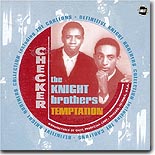 The title of The Knight Brothers disc, Temptation (Shout!)
, of course, refers to the potent soul single "Temptation 'Bout to Get
Me" from the Washington D.C. duo of Richard Dunbar and James Leon Diggs.
That powerful song alone would have kept the group renowned for time
immemorial. But this collection of all singles from the group's Checker
years gives the pleasure of a lifetime of collecting without the expense
and hassle! This album also includes eight tracks from The Carltons,
which included Diggs. Two of those selections feature Andy Mack. This is
a smart collection of ballad soul with hip, upbeat brass arrangements. The title of The Knight Brothers disc, Temptation (Shout!)
, of course, refers to the potent soul single "Temptation 'Bout to Get
Me" from the Washington D.C. duo of Richard Dunbar and James Leon Diggs.
That powerful song alone would have kept the group renowned for time
immemorial. But this collection of all singles from the group's Checker
years gives the pleasure of a lifetime of collecting without the expense
and hassle! This album also includes eight tracks from The Carltons,
which included Diggs. Two of those selections feature Andy Mack. This is
a smart collection of ballad soul with hip, upbeat brass arrangements.
--- Tom Schulte
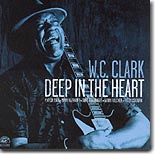 For
those that were expecting a repeat of the deep soul flavor of W.C.
Clark's last Alligator CD, From Austin With Soul, you are in
for a surprise. This new release, Deep In The Heart, leans much
more heavily towards Texas R&B than the soul leanings of that prior
release which was reviewed so favorably here in our
June 2002 issue of Blues Bytes. That release
was a deep soul collector's treasure, with many references to Stax & Hi
Records such as "How Long Is A Heartache Supposed To Last." Although
this new release does cull some tunes from that era, the overall feeling
is a bluesy, harder one on this release. A glance at some of the old
school tunes like Dan Penn's "You Left The Water Running," originally
recorded by James & Bobby Purify and available on their wonderful
Shake a Tail Feather release (also reviewed in the
June 2002 Blues Bytes), this time out is given
an updated sound with Marcia Ball's excellent vocals adding a Texas feel
to this duet classic. Another case in point is Joe Tex's "I Want To Do
Everything For You," with Clark's lead guitar once again putting a Lone
Star State tag on this version. He is joined on this track by the
wonderful Ruthie Foster. The Fabulous Thunderbirds are covered here with
a cool version of "Twist Of The Knife," as is John Hiatt's great "Tip Of
My Tongue." The latter is given the good old deep soul treatment and
would have fit just as well on From Austin With Soul. Once again
I direct your attention to Clark's very emotional take on this track,
making it one for the ages. Delbert McClinton's "Ain't Lost Nothing" is
a great choice here and of course has it's roots in Texas. "Soul Kind of
Loving" is another duet with Marcia Ball and it features Marcia's great
piano in addition to her vocals. Clark's "My Texas Home" is a straight
blues that works really well with the other tunes chosen. It's back to
the Hi Records catalog with a great version of "I Didn't Know The
Meaning of Pain," originally recorded by Otis Clay. It can be found on
The Complete Otis Clay on Hi (another CD no one should be
without). This release ends with a rousing version of the classic "Okie
Dokee Stomp'" and will surely get you up on your feet and wishing for a
dance floor. Many thanks to W.C. once again for another fine outing, and
kudos to those responsible for the great song selection. It's a delight
to hear some of these obscure tracks brought back to life. Another
winner. What a great month this has been for new releases. For
those that were expecting a repeat of the deep soul flavor of W.C.
Clark's last Alligator CD, From Austin With Soul, you are in
for a surprise. This new release, Deep In The Heart, leans much
more heavily towards Texas R&B than the soul leanings of that prior
release which was reviewed so favorably here in our
June 2002 issue of Blues Bytes. That release
was a deep soul collector's treasure, with many references to Stax & Hi
Records such as "How Long Is A Heartache Supposed To Last." Although
this new release does cull some tunes from that era, the overall feeling
is a bluesy, harder one on this release. A glance at some of the old
school tunes like Dan Penn's "You Left The Water Running," originally
recorded by James & Bobby Purify and available on their wonderful
Shake a Tail Feather release (also reviewed in the
June 2002 Blues Bytes), this time out is given
an updated sound with Marcia Ball's excellent vocals adding a Texas feel
to this duet classic. Another case in point is Joe Tex's "I Want To Do
Everything For You," with Clark's lead guitar once again putting a Lone
Star State tag on this version. He is joined on this track by the
wonderful Ruthie Foster. The Fabulous Thunderbirds are covered here with
a cool version of "Twist Of The Knife," as is John Hiatt's great "Tip Of
My Tongue." The latter is given the good old deep soul treatment and
would have fit just as well on From Austin With Soul. Once again
I direct your attention to Clark's very emotional take on this track,
making it one for the ages. Delbert McClinton's "Ain't Lost Nothing" is
a great choice here and of course has it's roots in Texas. "Soul Kind of
Loving" is another duet with Marcia Ball and it features Marcia's great
piano in addition to her vocals. Clark's "My Texas Home" is a straight
blues that works really well with the other tunes chosen. It's back to
the Hi Records catalog with a great version of "I Didn't Know The
Meaning of Pain," originally recorded by Otis Clay. It can be found on
The Complete Otis Clay on Hi (another CD no one should be
without). This release ends with a rousing version of the classic "Okie
Dokee Stomp'" and will surely get you up on your feet and wishing for a
dance floor. Many thanks to W.C. once again for another fine outing, and
kudos to those responsible for the great song selection. It's a delight
to hear some of these obscure tracks brought back to life. Another
winner. What a great month this has been for new releases.
What have we here? Hmm, another incredible new
release from our brothers across the pond in merry old England in
Right Where I Belong (One On One Records), from Willie Walker &
the Butanes. Once again they have taken a legendary southern soul
singer into the studio and have come out with this great 2004 release
that closely follows the style and heritage of the best of the '60s work
of James Carr or O.V. Wright.Willie Walker was a label mate of both the
aforementioned legends at the Memphis-based Goldwax Records in the
1960s, and to this day has not lost any of the strength or technique in
his voice; anyone who cherishes those old Goldwax recordings will just
love this release. All of the 14 songs were written by band member
Curtis Obeda and all could have been written and arranged 40 years ago.
My feeling upon hearing this CD for the first time, was it was like
finding a great lost James Carr album from 1964. The vocals and
arrangements are so true to its heritage that you are in a time warp. A
guitar, organ and those glorious horns open the CD's first song, "I
Don't Mind At All," and you are in soul nirvana. It is apparent from the
first few bars that Walker remembers those glorious years, and we are
about to relive them. A slow burner, "(We Gotta) Put Out The Fire,"
follows and it too has those great horn lines and female backing. "No
Longer For Me" is a southern ballad written in 1995 and intended for
James Carr. The fifth song "Right Where I Belong," sounds like it was
stolen from the O.V. Wright songbook, the vocals paralleling that great
master's classic phrasing. "Give As Good As It Gets" has one of those
memorable hooks that you will surely be singing along with. The deep
"Sometimes Love's Not Enough" opens with a Hammond organ and guitar and
gives us a lesson in how to build intensity in even the slowest of
ballads. "I Don't Know If I Can Make It Through" sounds like it could
have appeared on one of those classic Stax/Volt Otis Redding LPs. The
absolutely perfect ballad "Crying To Do" (my favorite track on this CD)
is a close cousin to all those Goldwax singles. What a track. The 13th
track, "Ain't It Funny," is six minutes of deep soul and not a minute
too long. The final track, "I Feel It," ends the CD on an upbeat note
with those excellent backing girls, some fine piano, and Obeda's guitar
leaving us with the felling that we have just finished listening to a
near perfect release. How often can we say that? Find this CD at any
cost. You will listen to it for years to come. A gem.
--- Alan Shutro
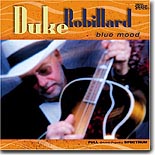 Veteran
blues guitarist Duke Robillard has consistently been one of the
finest practicioners of the West Coast / Texas jump blues style, with an
extra emphasis on the music of T-Bone Walker. Except for a couple of
ill-advised forays into other blues sounds in an apparent attempt to
expand his audience, Robillard has consistently been one of the best in
this genre, beginning way back when he took Roomful of Blues onto the
national scene. No one does T-Bone Walker like Robillard. Thus, it was
high time that he recorded an entire disc of tunes by the progenitor of
Texas / California blues guitar. Blue Mood (Stony Plain) captures
Robillard at his best on a dozen T-Bone songs. He avoids making this
disc too clichéd by omitting some of Walker's better known numbers, such
"Stormy Monday," which was already done by Robillard on previous
recordings. But classics like "T-Bone Shuffle" and "T-Bone Boogie" are
here. The mood gets jumping right away with "Lonesome Woman Blues," as
band members Matt McCabe (piano) and sax players Doug James, Sax Gordon
Beadle and Bill Novick are all featured prominently; behind the scenes,
Jesse Williams puts down on steady thumping acoustic bass beat. Other
strong numbers include the slow blues "Love Is A Gamble" and the mambo-ish
"Hard Way," although there's really not a weak cut here. If you're a fan
of either Duke Robillard or T-Bone Walker (and who isn't?), then you
need to Blue Mood to your CD collection. Veteran
blues guitarist Duke Robillard has consistently been one of the
finest practicioners of the West Coast / Texas jump blues style, with an
extra emphasis on the music of T-Bone Walker. Except for a couple of
ill-advised forays into other blues sounds in an apparent attempt to
expand his audience, Robillard has consistently been one of the best in
this genre, beginning way back when he took Roomful of Blues onto the
national scene. No one does T-Bone Walker like Robillard. Thus, it was
high time that he recorded an entire disc of tunes by the progenitor of
Texas / California blues guitar. Blue Mood (Stony Plain) captures
Robillard at his best on a dozen T-Bone songs. He avoids making this
disc too clichéd by omitting some of Walker's better known numbers, such
"Stormy Monday," which was already done by Robillard on previous
recordings. But classics like "T-Bone Shuffle" and "T-Bone Boogie" are
here. The mood gets jumping right away with "Lonesome Woman Blues," as
band members Matt McCabe (piano) and sax players Doug James, Sax Gordon
Beadle and Bill Novick are all featured prominently; behind the scenes,
Jesse Williams puts down on steady thumping acoustic bass beat. Other
strong numbers include the slow blues "Love Is A Gamble" and the mambo-ish
"Hard Way," although there's really not a weak cut here. If you're a fan
of either Duke Robillard or T-Bone Walker (and who isn't?), then you
need to Blue Mood to your CD collection.
Love Jones (DG Records) comes from
Arizona band Big Daddy D and the Dynamites, an up and coming
group that's just starting to scratch the surface of the Southwest club
scene. Their previous release, That's D Blues, received a
favorable review in the
June 2003
edition of Blues Bytes, and they are showing that they continue to
mature as a band. Sax player Anton Teschner really shines on the first
two cuts, the blues shuffle "Call Me" and the rockin' "Love Jones."
Porras does his best vocal work on the funky Albert Collins-ish original
"Can't Get Enough," that again gives Teschner significant solo time.
Porras gets his chance in the spotlight as guitarist on the slow blues
instrumental "Folini's Blues." The only covers are a pair of renditions
of John Hiatt's "It Feels Like Rain," one done in the studio and the
second version a redundant live cut. For more info on Big Daddy D and
the Dynamites, check the band website at
www.BigDaddyDBlues.com.
 "He
couldn't play shit, but he sure made it sound good!" This is the
statement that Hound Dog Taylor wanted to leave with the blues
world about himself. While it's not totally accurate (I, for one,
believe that he played better than "shit"), Taylor was indeed a genius
at taking a raucous, out of tune blues recorded on a cheap guitar and a
fuzzy amp and making the music sound like pure blues heaven. Alligator
owner Bruce Iglauer resisted releasing the live recordings found on
Release The Hound (Alligator) due to what he considered to be
sub-standard sound quality. He even apologizes for the "warts" in the
liner notes. No apologies necessary, Bruce, as mastering engineer Dan
Stout did some wonderful things to bring these 14 cuts up to near studio
quality, making Release The Hound an essential purchase. The
energy level is high throughout the disc (as if one would expect
anything less from Taylor) and it's all great music. Backed by the
regular Houserockers lineup (Brewer Phillips on guitar and either Ted
Harvey or Levi Warren on drums), they slam through Taylor classics like
"Sadie," "Gonna Send You Back To Georgia, "Sitting At Home Alone," and
Taylor's quintessential cover of Ray Charles' "What'd I Say?" What can I
say? Buy this disc. Play it often. Play it loud. Enjoy it. "He
couldn't play shit, but he sure made it sound good!" This is the
statement that Hound Dog Taylor wanted to leave with the blues
world about himself. While it's not totally accurate (I, for one,
believe that he played better than "shit"), Taylor was indeed a genius
at taking a raucous, out of tune blues recorded on a cheap guitar and a
fuzzy amp and making the music sound like pure blues heaven. Alligator
owner Bruce Iglauer resisted releasing the live recordings found on
Release The Hound (Alligator) due to what he considered to be
sub-standard sound quality. He even apologizes for the "warts" in the
liner notes. No apologies necessary, Bruce, as mastering engineer Dan
Stout did some wonderful things to bring these 14 cuts up to near studio
quality, making Release The Hound an essential purchase. The
energy level is high throughout the disc (as if one would expect
anything less from Taylor) and it's all great music. Backed by the
regular Houserockers lineup (Brewer Phillips on guitar and either Ted
Harvey or Levi Warren on drums), they slam through Taylor classics like
"Sadie," "Gonna Send You Back To Georgia, "Sitting At Home Alone," and
Taylor's quintessential cover of Ray Charles' "What'd I Say?" What can I
say? Buy this disc. Play it often. Play it loud. Enjoy it.
Any new disc by blues piano legend Pinetop
Perkins is always a treat. Ladies Man (M.C. Records) includes
guest appearances by female blues singers Deborah Coleman, Susan
Tedeschi, Madeleine Peyroux, Ruth Brown, Marcia Ball, Angela Strehli,
Odetta and Saffire's Ann Rabson, plus one cut with guitarist Elvin
Bishop. Pinetop also gets to handle the vocals on three cuts. Being
selfish about it, I would rather have had a whole new album featuring
just Pinetop. But that's not what this disc is all about, so I'll be
satisfied with it as it is. OK, I like the four cuts ("Big Fat Mama,"
"Kansas City," "How Long" and "Chicken Shack") with Pinetop on vocals
the best --- that goes without saying. These songs came from a live
session in California when Pinetop actually couldn't play the piano due
to a hand injury; filling in quite capably on the 88s was Tucson,
Arizona artist Lisa Otey. The rest of the backing band for that session
consisted of Willie "Big Eyes" Smith's regular touring group, including
Smith himself on harp and Chicago stalwart Bob Stroger on bass. "How
Long" adds Bishop on slide guitar; in my opinion, this one's the
highlight of the CD. Smith's harp work is especially nice. Elsewhere on
the disc, Pinetop and Marcia Ball team up at the piano for a revamped
version of his instrumental classic, this time calling it "Pinetop's New
Boogie Woogie." It smokes. A similar groove occurs when Rabson joins
Perkins on a pleasant instrumental version of "Careless Love." Ladies
Man gave a lot of artists a chance to show their love for this great
and influential blues artist. For that reason, this one's a must have.
--- Bill Mitchell
|


![]()